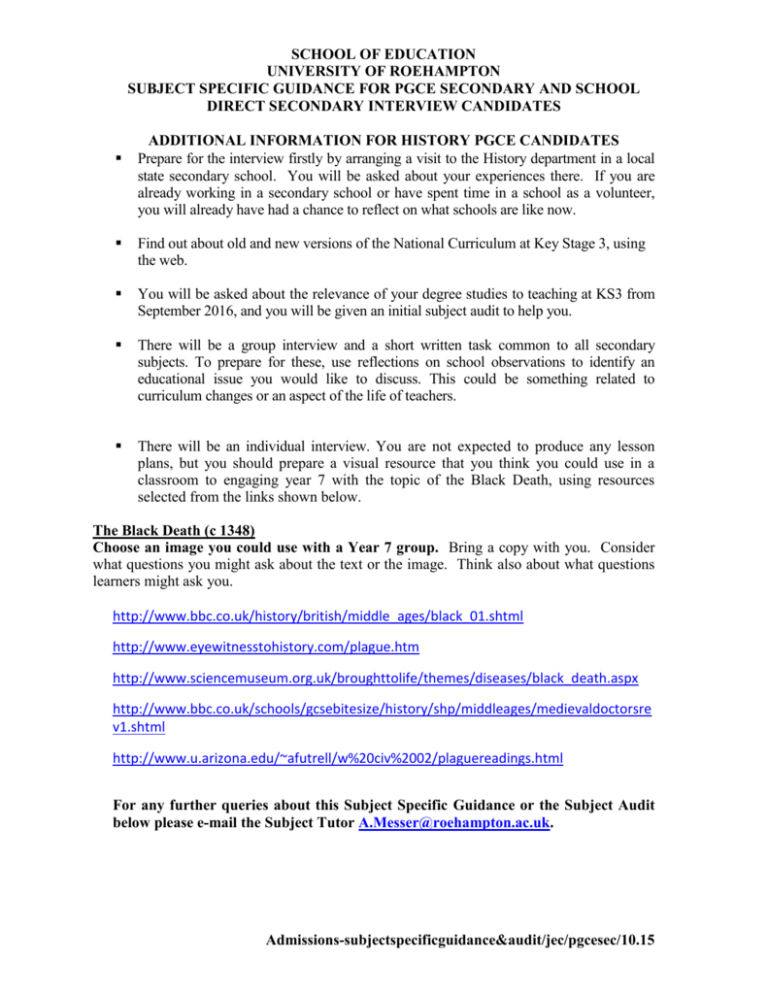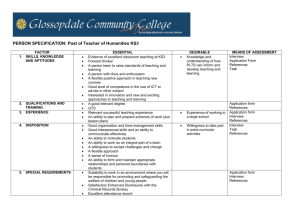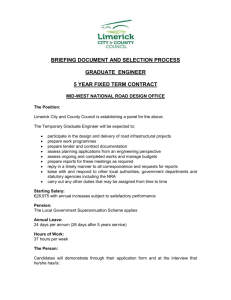KS3 and overview KS4-5 - University of Roehampton
advertisement

SCHOOL OF EDUCATION UNIVERSITY OF ROEHAMPTON SUBJECT SPECIFIC GUIDANCE FOR PGCE SECONDARY AND SCHOOL DIRECT SECONDARY INTERVIEW CANDIDATES ADDITIONAL INFORMATION FOR HISTORY PGCE CANDIDATES Prepare for the interview firstly by arranging a visit to the History department in a local state secondary school. You will be asked about your experiences there. If you are already working in a secondary school or have spent time in a school as a volunteer, you will already have had a chance to reflect on what schools are like now. Find out about old and new versions of the National Curriculum at Key Stage 3, using the web. You will be asked about the relevance of your degree studies to teaching at KS3 from September 2016, and you will be given an initial subject audit to help you. There will be a group interview and a short written task common to all secondary subjects. To prepare for these, use reflections on school observations to identify an educational issue you would like to discuss. This could be something related to curriculum changes or an aspect of the life of teachers. There will be an individual interview. You are not expected to produce any lesson plans, but you should prepare a visual resource that you think you could use in a classroom to engaging year 7 with the topic of the Black Death, using resources selected from the links shown below. The Black Death (c 1348) Choose an image you could use with a Year 7 group. Bring a copy with you. Consider what questions you might ask about the text or the image. Think also about what questions learners might ask you. http://www.bbc.co.uk/history/british/middle_ages/black_01.shtml http://www.eyewitnesstohistory.com/plague.htm http://www.sciencemuseum.org.uk/broughttolife/themes/diseases/black_death.aspx http://www.bbc.co.uk/schools/gcsebitesize/history/shp/middleages/medievaldoctorsre v1.shtml http://www.u.arizona.edu/~afutrell/w%20civ%2002/plaguereadings.html For any further queries about this Subject Specific Guidance or the Subject Audit below please e-mail the Subject Tutor A.Messer@roehampton.ac.uk. Admissions-subjectspecificguidance&audit/jec/pgcesec/10.15 SCHOOL OF EDUCATION UNIVERSITY OF ROEHAMPTON SUBJECT SPECIFIC GUIDANCE FOR PGCE SECONDARY AND SCHOOL DIRECT SECONDARY INTERVIEW CANDIDATES INITIAL HISTORY SUBJECT KNOWLEDGE AUDIT: KS3 and overview KS4-5 Candidate’s name: Bring a completed version of this audit with you to the interview. It is NOT, however, used as part of the selection process. We use this to adapt our sessions to address ways to develop specific subject knowledge and to help you organise your reading if you gain a place. Please fill it in honestly: so that it is useful in helping us to support the development of your subject knowledge. Use this link to understand about the new National Curriculum: https://www.gov.uk/government/uploads/system/uploads/attachment_data/file/210969/NC_framework_document__FINAL.pdf Look also at examination board outlines for new GCSE courses, search for Edexcel, AQA, OCR and WJEC Show –for each period/theme- your level of study; how recent this study was, and your confidence about your subject knowledge in each area using colours: green for highly confident, yellow for some confidence and red for low confidence. We expect all three colours to appear on your audit. Admissions-subjectspecificguidance&audit/jec/pgcesec/10.15 SCHOOL OF EDUCATION UNIVERSITY OF ROEHAMPTON SUBJECT SPECIFIC GUIDANCE FOR PGCE SECONDARY AND SCHOOL DIRECT SECONDARY INTERVIEW CANDIDATES Key stage/unit Topics Level of How recent Confidence study e.g. 6 months Colour code These are some of the events and issues that will e.g. at ago, twenty green/High be covered at KS3 from September 2014 (many University, at years Yellow/Med. topics present in previous versions of NC) GCSE Red/low confidence The development of This could include: Church, state and society the Norman Conquest in Medieval Britain 1066- Christendom, the importance of religion and the 1509 Crusades the struggle between Church and crown Magna Carta and the emergence of Parliament the English campaigns to conquer Wales and Scotland up to 1314 society, economy and culture e.g. feudalism, religion in daily life (parishes, monasteries, abbeys), farming, trade and towns (especially the wool trade), art, architecture and literature the Black Death and its social and economic impact the Peasants’ Revolt the Hundred Years War the Wars of the Roses; Henry VII and attempts to restore stability The development of This could include: Church, state and society Renaissance and Reformation in Europe in Britain 1509-1745 the English Reformation and Counter Reformation (Henry VIII to Mary I) the Elizabethan religious settlement and conflict with Catholics (including Scotland, Spain and Ireland) Admissions-subjectspecificguidance&audit/jec/pgcesec/10.15 SCHOOL OF EDUCATION UNIVERSITY OF ROEHAMPTON SUBJECT SPECIFIC GUIDANCE FOR PGCE SECONDARY AND SCHOOL DIRECT SECONDARY INTERVIEW CANDIDATES the first colony in America and first contact with India the causes and events of the civil wars throughout Britain the Interregnum (including Cromwell in Ireland) the Restoration, ‘Glorious Revolution’ and power of Parliament the Act of Union of 1707, the Hanoverian succession and the Jacobite rebellions of 1715 and 1745 society, economy and culture across the period: e.g. work and leisure in town and country, religion and superstition in daily life, theatre, art, music and literature Ideas, political power, industry and empire: Britain, 1745-1901 This could include: the Enlightenment in Europe and Britain, with th links back to 17 Century thinkers and scientists and the founding of the Royal Society Britain’s transatlantic slave trade: its effects and its eventual abolition the Seven Years War and The American War of Independence the French Revolutionary wars Britain as the first industrial nation – the impact on society party politics, extension of the franchise and social reform the development of the British Empire with a depth study (e.g. of India) Admissions-subjectspecificguidance&audit/jec/pgcesec/10.15 SCHOOL OF EDUCATION UNIVERSITY OF ROEHAMPTON SUBJECT SPECIFIC GUIDANCE FOR PGCE SECONDARY AND SCHOOL DIRECT SECONDARY INTERVIEW CANDIDATES Ireland and Home Rule Darwin’s ‘On The Origin of Species’ Challenges for Britain, In addition to studying the Holocaust, this could Europe and the wider include: world 1901 to the present women’s suffrage day the First World War and the Peace Settlement the inter-war years: the Great Depression and the rise of dictators the Second World War and the wartime leadership of Winston Churchill the creation of the Welfare State Indian independence and end of Empire social, cultural and technological change in postwar British society Britain’s place in the world since 1945 A local history study For example: a depth study linked to one of the British areas of study listed above a study over time, testing how far sites in their locality reflect aspects of national history (some sites may predate 1066) a study of an aspect or site in local history dating from a period before 1066 The study of an aspect or theme in British history that consolidates and extends pupils’ chronological knowledge from before 1066 For example: the changing nature of political power in Britain, traced through selective case studies from the Iron Age to the present Britain’s changing landscape from the Iron Age to the present Admissions-subjectspecificguidance&audit/jec/pgcesec/10.15 SCHOOL OF EDUCATION UNIVERSITY OF ROEHAMPTON SUBJECT SPECIFIC GUIDANCE FOR PGCE SECONDARY AND SCHOOL DIRECT SECONDARY INTERVIEW CANDIDATES a study of an aspect of social history, such as the impact through time of the migration of people to, from and within the British Isles a study in depth into a significant turning point e.g. the Neolithic Revolution At least one study of a significant society or issue in world history and its interconnections with other world developments For example: Mughal India 1526-1857; China’s Qing dynasty 1644-1911; Changing Russian empires c.1800-1989; th USA in the 20 Century. Examination classes 14-19 Look at the following topics and highlight areas of expertise in green, areas for development in yellow and unfamiliar areas in red. Add others you studied if you wish. For ideas of topics covered use the web to visit examination board requirements. Year/course GCSE: Mix of AQA, OCR and Edexcel Common topics in past examinations, some remain current SHP American West Medicine through time Crime and punishment British society 1906-1918 Russian Revolution, Stalin USA 1919-41 and 1941-80 Admissions-subjectspecificguidance&audit/jec/pgcesec/10.15 SCHOOL OF EDUCATION UNIVERSITY OF ROEHAMPTON SUBJECT SPECIFIC GUIDANCE FOR PGCE SECONDARY AND SCHOOL DIRECT SECONDARY INTERVIEW CANDIDATES International Relations 1919-39 Superpowers/Cold War World War 1 Rise of Nazi Germany Holocaust Origins WW2 Home Front Vietnam Arab/Israel conflict AS/A2 Nazi Germany GB and Ireland 1798-1921 Large range of topics Gladstone and Disraeli taught – here are some Hitler and Stalin popular ones in the past Tudor and Stuarts 1485-1603 Interwar Britain Russian Rev and Stalin’s Russia Napoleon GB 1750-1900 Civil Rights USA Fascist Italy English Reformation Colonisation of Africa Admissions-subjectspecificguidance&audit/jec/pgcesec/10.15






